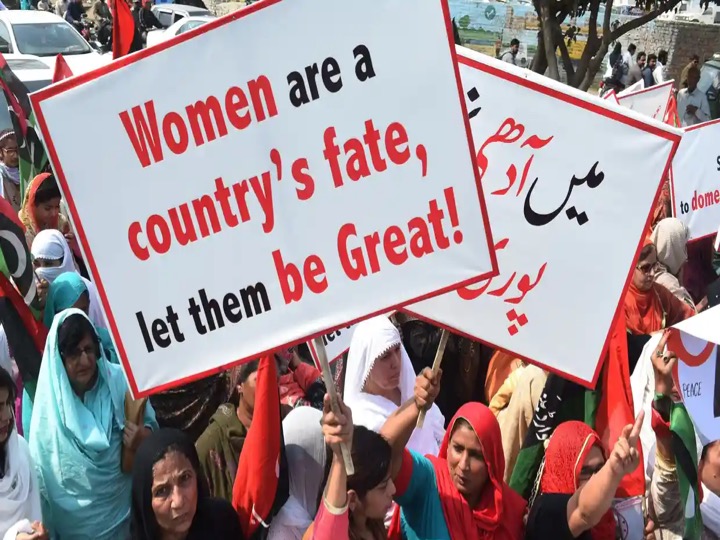Women take to the streets of Pakistan to rewrite their place in society

Sabrina Toppa, in Lahore, The Guardian - Photograph: Arif Ali/AFP/Getty Images
Campaigners will march on International Women’s Day to protest against harassment, child marriage and ‘honour killings’
During Jalwat Ali’s school days in Lahore, there were limited spaces to gather with other women, never mind flood the streets with punchy placards.
Public spaces often feel constricted in Pakistan, as though under critical male scrutiny. But over the past few days, Ali has been recruiting dozens of women, from garment workers to domestic helpers who barely get a day off. “To solve any problem, we need to make a collective effort,” she says.
On Friday, a series of International Women’s Day marches will be held in several Pakistani cities, calling for women’s place in society to be rewritten.
Organisers hope the aurat march (“women’s march”) and aurat azadi march (“women’s liberation march”) will bring a cross-section of society on to the streets to draw attention to the struggle for reproductive, economic, and social justice across Pakistan. The marchers will be protesting against sexual harassment in the workplace, child marriage, “honour killings”, wage inequalities and limited political representation.
The aim is to reach ordinary women in factories, homes, and offices, says Nighat Dad, an aurat march organiser in Lahore.
“We want an organic movement by women demanding equal access to justice and ending discrimination of all kinds,” she says.
Her fellow activist, Leena Ghani, points out that Pakistani women have a history of taking to the streets, famously during military dictator Zia ul-Haq’s martial law in the 1980s: “Many women before us have paved the way for us. There is a tradition of women being politically progressive in Pakistan.”
While Pakistan has made major strides towards gender equality – achieving greater workforce participation, reserved seats in parliament, and anti-discrimination laws for women – poorer, marginalised women and transgender citizens continue to struggle, Ghani says.
Designer Shehzil Malik has created a series of striking posters for the aurat march that counter typical representations of Pakistani women as docile and subservient. “These women mean business,” says Malik.
Speakers at the Lahore march range from a woman fighting to reform marriage laws to the women who worked on the landmark Punjab Domestic Workers’ Act – legislation that outlaws child labour in homes and provides maternity benefits to workers.
“The aurat march will allow us to display unity with other workers and women,” said Arooma Shahzad, a key campaigner on the new domestic workers’ laws.
Others, like Laaleen Sukhera, a writer with three young daughters in Lahore, will march to protest against Pakistan’s regressive family laws. After years of failing to receive adequate child support and alimony, Sukhera’s acrimonious divorce was an unpleasant awakening.
“The time for change is now,” she says. “The Pakistani mindset tends to be Victorian. The system frequently grants mothers custody, but makes life a living hell for them, with little or no support for raising kids.”
Women are also protesting against discriminatory policies in universities, where male and female students are afforded different levels of freedom. “Most university hostels have a relationship of mistrust and constant surveillance of women,” says Wafa Asher, 21, a university student in Lahore participating in the aurat march. “There is over-policing of dress and behaviour and early curfews for women.”
A Pakistani university recently caused a furore on social media by banning women from wearing skinny jeans and sleeveless shirts.
“Given the issues the average Pakistani woman faces – sometimes with nowhere to go – creating a space that recognises a woman’s right to be there is integral,” says Kanwal Ahmed, the founder behind women-only Facebook group Soul Sisters, which has attracted nearly 150,000 people.
With more than half of Pakistan’s informal sector consisting of women, the plight of female workers is also a central theme. For months, the government has not paid the all-female staff at Pakistan’s first and only Violence Against Women Centre, the founder Salman Sufi said. The centre in Multan has handled almost 3,000 cases of abuse, rape, and domestic violence, and has been a key instrument in combating gender-based violence that other government departments neglect.
For Ali, these women on the economic margins are the unsung heroes of Pakistan’s burgeoning feminist movement. They face conflicting pressures between their work and family lives. While Pakistani women are increasingly participating in the labour force, their husbands often refuse to take on household chores, she says. “There’s a double, triple burden on these women,” Ali adds.“When they go home after a full days’ work, they face the same problem in their domestic lives – work.”
The aurat march is a step forward, she says. “We can’t work in silos or as members of different groups. Our demands are for all women – these injustices affect us all,” Ali says.
|